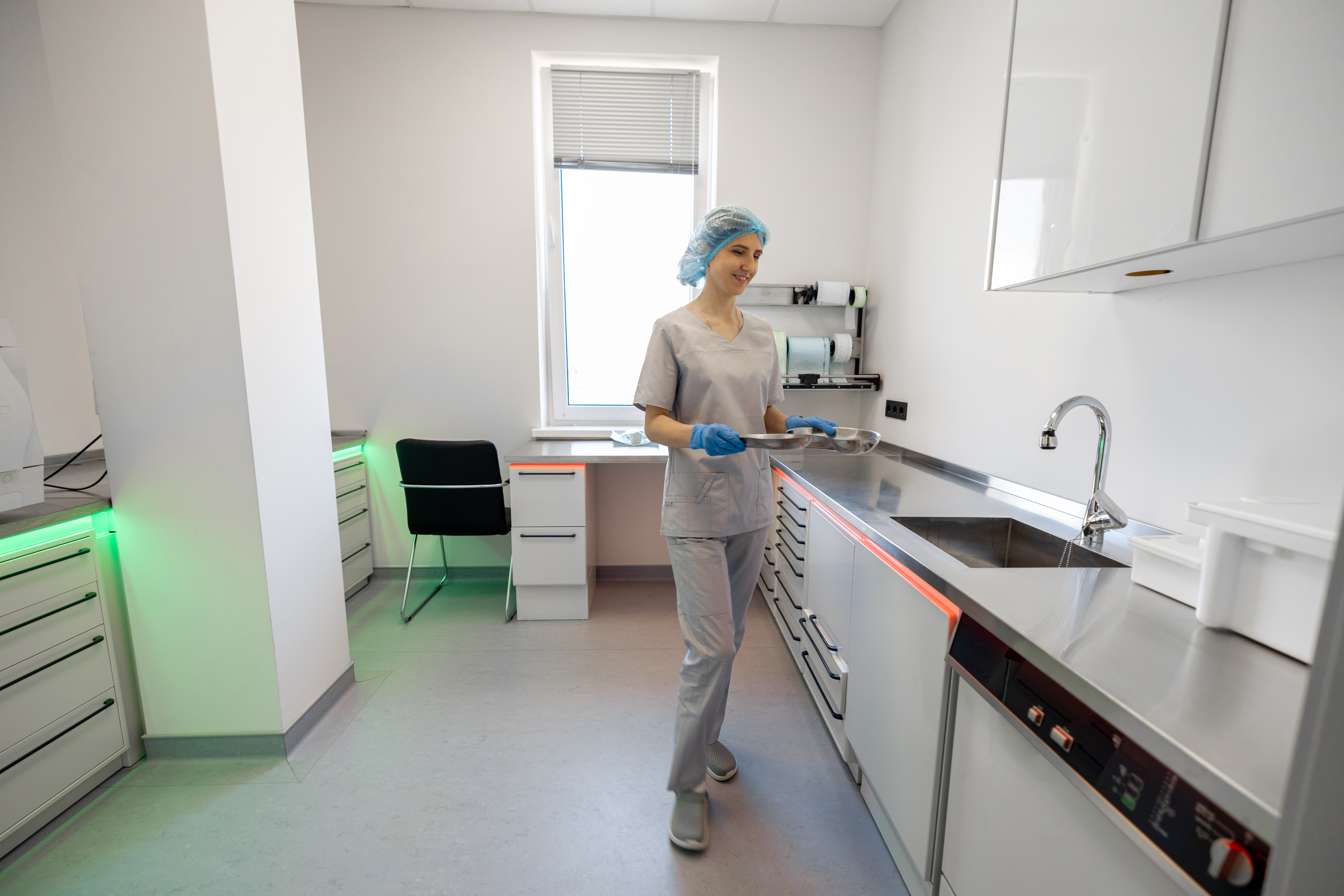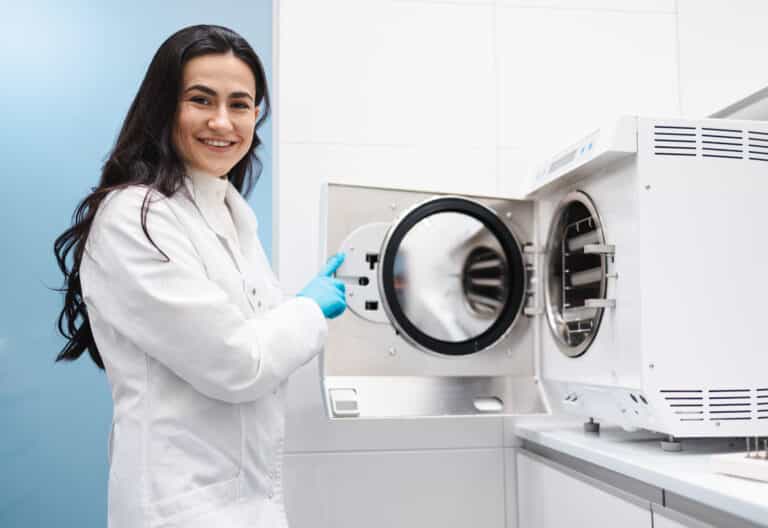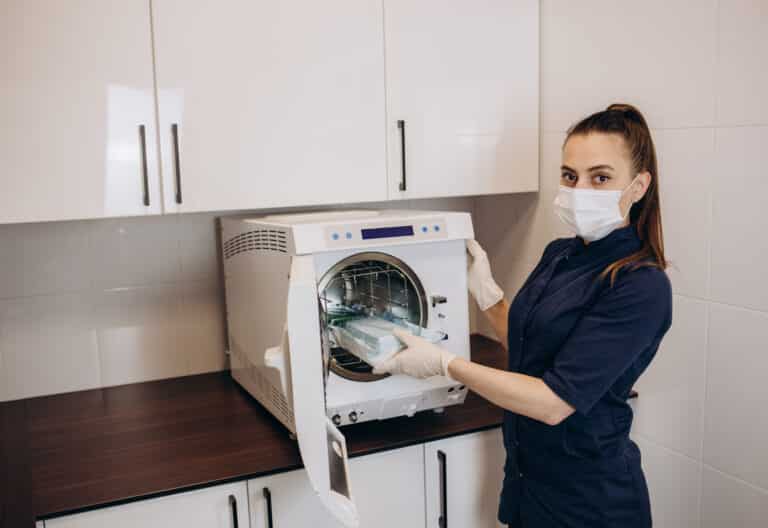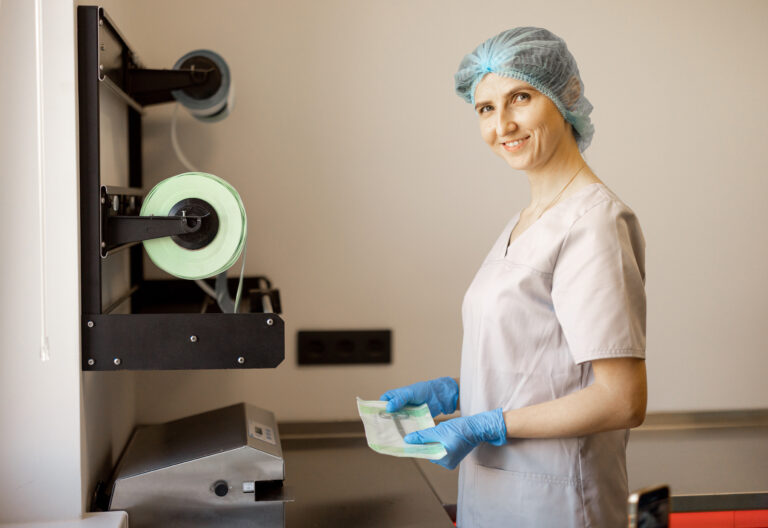In healthcare, Sterile Processing Technicians are the backbone of patient safety.
Their diligent work behind the scenes ensures that medical instruments are clean, sterile, and ready for use in life-saving procedures.
So, if you are interested in this career, and want to know about the multifaceted role of a sterile processing technician, the responsibilities, what a day in their life looks like, and the essential skills they possess, then this article is a must-read.
Plus, we have also tried to answer some of the most frequently asked questions about the career.
So, let’s get started –
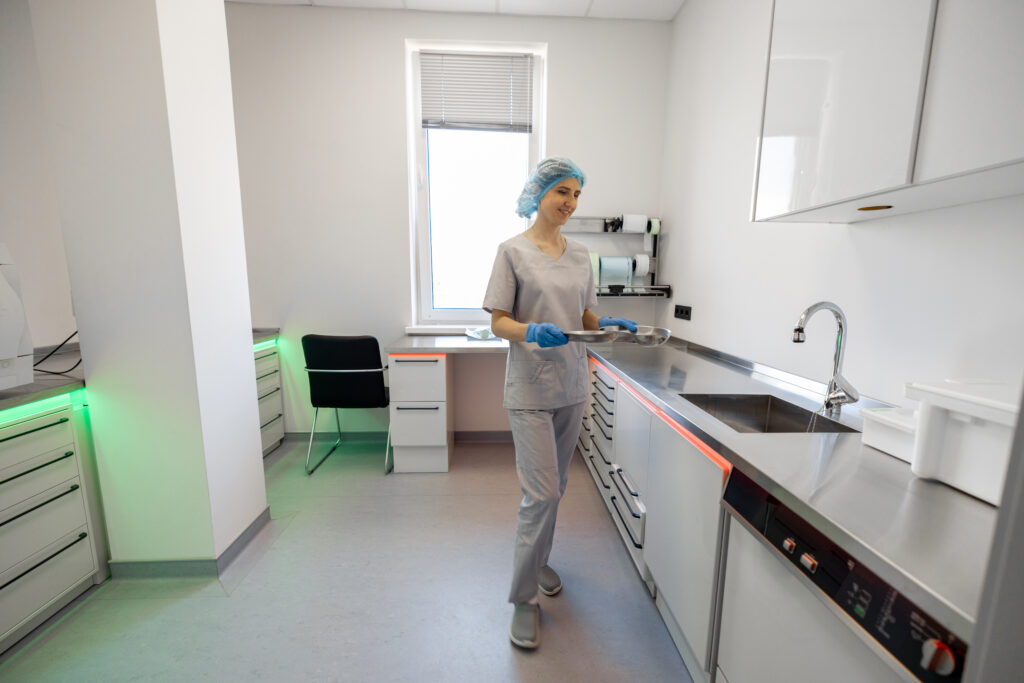
A Day in the Life of a Sterile Processing Technician
The life of a sterile processing technician is a symphony of meticulous tasks aimed at maintaining the cleanliness and sterility of medical instruments and equipment.
Their day typically begins with inspecting and sorting instruments, where they meticulously check for any signs of damage or contamination. This attention to detail is paramount to prevent the risk of infections during medical procedures.
Next comes the crucial process of cleaning and sterilizing instruments, utilizing specialized equipment and techniques to ensure they are free from harmful pathogens. This step is crucial in eliminating harmful pathogens and ensuring the instruments are safe for use in medical procedures.
Once sterilization is complete, Sterile Processing Technicians carefully assemble the instruments into trays or packs, ensuring they are organized and readily accessible for medical staff. This organizational skill is essential for streamlining procedures and optimizing efficiency within the sterile processing department.
Throughout the day, SPTs also manage inventory, track supplies, and communicate with healthcare professionals to ensure the seamless operation of the healthcare facility they work in.
Read:
-> What is a Sterile Processing Technician?
-> Sterile Processing Technician Requirements
-> How to Become a Sterile Processing Technician?
Roles and Responsibilities of a Sterile Processing Technician
Sterile Processing Technicians are crucial members of the healthcare team, playing a vital role in upholding the highest standards of cleanliness and sterility, ensuring the well-being of patients and the success of medical procedures.
Here are the various responsibilities of a Sterile Processing Technician:
Inspecting and Sorting Instruments
They are responsible for meticulously inspecting instruments for damage or defects and sorting them for cleaning and sterilization.
For instance, they may identify missing parts or malfunctioning instruments during the inspection process, ensuring that only high-quality instruments are used in medical procedures.
Cleaning And Decontamination
Medical instruments are expensive and cannot be discarded after a single use. However, instruments soiled with blood, tissues, or other body fluids pose a risk of infection if reused.
They play a crucial role in decontaminating these instruments by washing, rinsing, and thoroughly cleaning them to remove any visible debris or contaminants.
This step is foundational, as any remaining contaminants can compromise the quality of the sterilization process, potentially leading to infections or other serious issues for patients.
Sterilization Processes
Once the instruments are cleaned, they undergo sterilization to eliminate harmful microorganisms like bacteria and viruses. They carefully place the clean instruments in trays or packs and load them into specialized equipment called autoclaves.
Operating the autoclave requires knowledge of setting specific temperature, pressure, and duration parameters for effective sterilization.
This critical step reduces the risk of infections or complications during medical procedures, emphasizing patient safety and upholding the reputation of healthcare facilities.
Assembling And Packaging
Sterilized instruments are then assembled into sets or kits required for medical procedures. Proper packaging ensures easy access for healthcare professionals.
Accurate packaging and labeling are essential to avoid errors, as incorrectly packaged instruments may need to be reprocessed, consuming valuable time and resources.
Inventory Management
Managing inventory involves organizing instruments to ensure healthcare professionals have the necessary tools at the right time. This may include ordering, organizing, and restocking supplies to prevent shortages and maintain a smooth workflow in healthcare settings.
Following Protocols And Regulations
Quality is paramount in sterile processing, and they must adhere to strict measures to meet regulatory standards. Following industry best practices and standards ensures a sterile environment, minimizing the risk of contamination and maintaining patient safety during medical procedures.
So, by meticulously performing their duties, they significantly contribute to patient safety and the overall quality of healthcare delivery.
Also Read:
-> Certified Sterile Processing Technician
-> Sterile Processing Technician Certification
Skills of a Sterile Processing Technician and Why Are They Important?
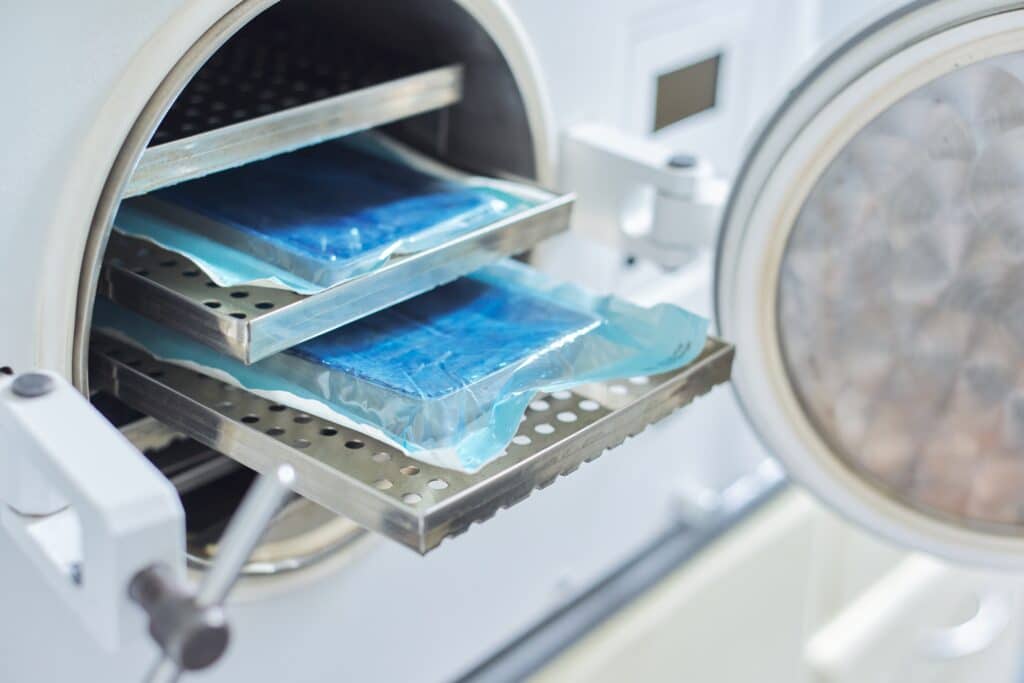
Sterile Processing Technicians play a crucial role in ensuring the safety and effectiveness of medical procedures through a range of skills.
Here are the skills that they possess:
Attention to Detail
As a Sterile Processing Technician, meticulous attention to detail is paramount in all aspects of your duties. Whether cleaning instruments, operating sterilization equipment like autoclaves, or packaging and labeling instruments, every task requires precision and thoroughness.
Even the smallest mistake could have serious consequences for patient safety and the reputation of the healthcare facility. Developing and maintaining a keen eye for detail is essential for success in this role.
For instance, a Sterile Processing Technician meticulously examines the surgical instruments for even the smallest cracks or residues before sterilization, ensuring that they meet the highest standards of cleanliness.
Technical Proficiency
While you don’t need to be an expert in machinery or coding, possessing technical proficiency is crucial for operating sterilization equipment effectively.
You need to be proficient in operating sterilization equipment, from autoclaves to ultrasonic cleaners, you must have a deep understanding of how to operate and maintain these essential tools to ensure the safety of medical procedures.
For instance, understanding how to set the correct temperature, pressure, and duration on autoclaves ensures thorough sterilization of instruments.
And, basic troubleshooting skills also come in handy for resolving equipment issues swiftly, contributing to uninterrupted sterilization processes.
So all of these are the technical aspects of this career and if you can get skilled that’s the best thing for your career.
Also Read:
-> Sterile Processing Technician Course
-> Sterile Processing Technician Programs
-> Sterile Processing Technician Certificate Program
-> Sterile Processing Technician Training Program Cost
Organizational Skill
As a Sterile Processing Technician, organizing instruments systematically is essential for efficient workflow and patient safety. Whether arranging instruments on sterilization equipment or preparing them for use in surgical procedures, organizational skills are key.
For instance, SPTs have to label and store instrument trays to ensure they are readily accessible during procedures. They also need to manage the inventory and coordinate with other healthcare professionals.
So all of these require staying organized and maintaining clear communication to ensure the smooth running of the clinic or hospital.
Communication Skills
Effective communication is essential for understanding the specific instrument needs of surgical teams, nurses, and other healthcare professionals.
Constant communication ensures that the right tools are available when needed, facilitating seamless procedures and minimizing disruptions.
Developing strong communication skills enables you to anticipate instrument requirements, address availability issues, and maintain a collaborative environment within the healthcare facility.
Problem-Solving Skills
Sterile Processing Technicians encounter various challenges, such as equipment malfunctions or sterilization issues, which require quick and effective problem-solving skills.
The ability to troubleshoot equipment issues, and find solutions for other issues, is invaluable in the fast-paced environment of sterile processing.
Whether it’s resolving equipment malfunctions or addressing unexpected challenges, problem-solving skills ensure continuous sterilization processes.
Being resourceful and adaptable allows SPTs to overcome obstacles and maintain the integrity of the sterile environment.
Adherence to Protocols
Adhering to strict protocols and regulatory standards is non-negotiable for Sterile Processing Technicians. Following industry best practices and guidelines maintains a sterile environment and minimizes the risk of contamination.
Upholding these standards is essential for ensuring patient safety during medical procedures and upholding the healthcare facility’s reputation.
So, these are the skills of a Sterile Processing Technician that enable them to play a critical role in safeguarding patient safety and maintaining the highest standards of healthcare quality.
Now, you must be wondering if you could gain the skills, get formal training, and become job-ready faster within 6 months.
Yes, you can!
Because there exists a program that helps you to start your Sterile Processing Technician career faster in just 4 months, without going to school, without a degree, without any student debt, at an affordable price, from the comfort of your home.
You May Also Like:
-> Sterile Processing Technician Salary
-> Sterile Processing Technician Resume
-> Sterile Processing Technician Job Description
Preppy’s Sterile Processing Technician Certification Training Program
Preppy’s Sterile Processing Technician Training Program is designed to provide comprehensive education and hands-on training, preparing students for a successful Sterile Processing Technician career.
With Our Sterile Processing Technician Certification Training Program, you get –
- 100% online, self-paced program from an accredited source
- A non-profit 150-year-old reputed accredited University certificate
- An externship opportunity close to where you live
- Helps you get ready for the nationally recognized certification exams
- The tuition cost is affordable under $2000
- The program could be completed in as little as 6 months
So, if you want all of these features in a single program and want to start your career faster, then check out Preppy’s Sterile Processing Technician Certification Training Program.
In Conclusion,
Sterile Processing Technicians play a crucial role in ensuring the safety and effectiveness of medical procedures by maintaining the cleanliness and sterility of medical instruments and equipment.
So, if all of these fascinates you and you want to know how you can start your Sterile Processing Technician career faster in as little as 6 months, without going to school, without a degree, without any student debt, at an affordable price, from the comfort of your home, then check out Preppy’s Sterile Processing Technician Certification Training Program.
FAQs – Sterile Processing Technician
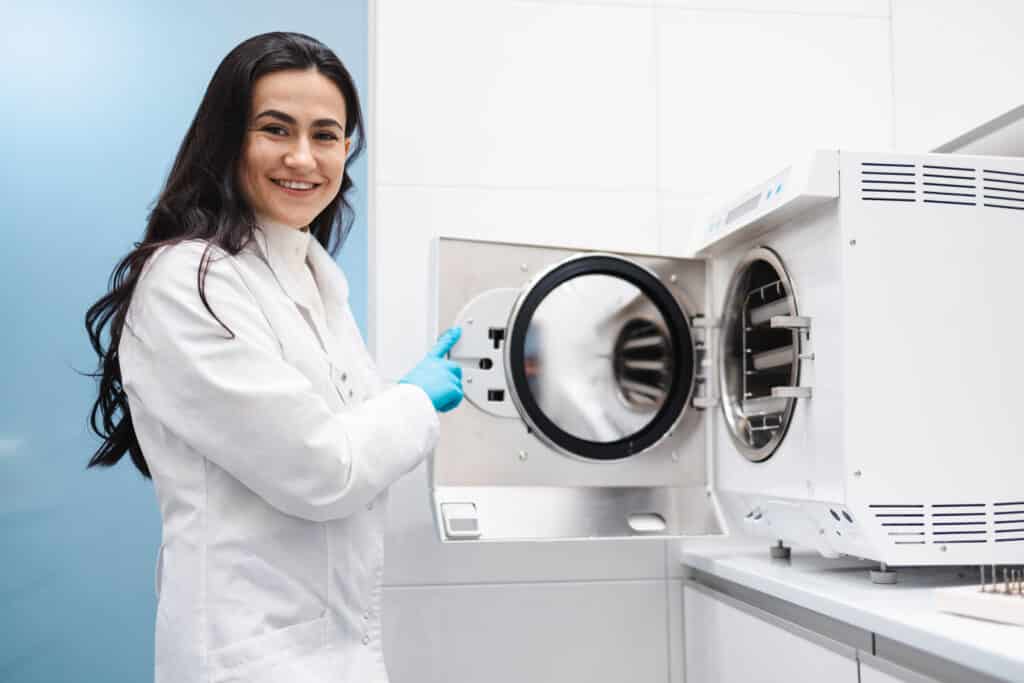
Do sterile processing techs wear scrubs?
Yes, sterile processing technicians typically wear scrubs while performing their duties. Scrubs are the recommended attire, that is comfortable and practical to allow ease of movement and provides a professional appearance in healthcare settings.
In addition to scrubs, Sterile Processing Technicians also wear Personal Protective Equipment (PPE) to reduce the risk of exposure to potential biohazards. This includes a hair covering, gloves, gown, face mask, and sometimes shoe covers, all of which are commonly worn while on duty.
Wearing all the protective gear minimizes the risk of them contracting any infections or diseases. The protective kits can be easily laundered thereby minimizing the risk of contamination.
Is sterile processing fast-paced?
The most common workplaces where sterile processing technicians work are fast-paced environments where they clean, disinfect, and sterilize medical instruments.
However, the pace of work in sterile processing can vary depending on factors such as the size of the facility, the volume of procedures being performed, and the specific tasks at hand.
In some healthcare settings, sterile processing departments may experience periods of high activity, especially during peak procedure times, which can make the work environment fast-paced.
During these busy periods, sterile processing technicians may need to efficiently process a large number of instruments while ensuring accuracy and adherence to sterilization protocols. And, there may also be times when the workload is more manageable.
Overall, sterile processing requires a balance of speed and precision to maintain efficiency while upholding the highest standards of cleanliness and sterility. Adaptability and the ability to work effectively under varying levels of pressure are important traits for sterile processing technicians to possess in order to thrive in this dynamic work environment.
Is being a sterile processing technician worth it?
There is no perfect answer to this. While many Sterile Processing Technicians enjoy their jobs, some just hate it.
So, we can now put forward the facts on why this career is loved or hated. In simple terms, the pros and cons of this career, and then it’s up to you to decide if it’s worth it for you or not.
Here are the Pros:
Decent Salary
They earn a decent salary. As per BLS May 2023 data, on average, medical equipment preparers earn a salary of $47,410 per year, which is $22.79 per hour.
Variety of options to choose your Work setting
They are employed in various settings, like Hospitals, Surgical Centers/Clinics, Outpatient Care Centers, Dental Offices, Long-Term Care Facilities, and Laboratories.
So with this career, you can choose where you would like to work.
Job Security and High Demand
They are in very high demand. The BLS projects the employment growth for medical equipment preparers, including the SPTs as 8.3% from 2020 to 2030. This means that there are about 7,900 new job openings for aspirants in this field.
Now, since the demand is very high the nature of the job is quite secure.
Growth Opportunities
This is very important for any career. You want to set your professional goals high so you don’t feel stuck in the moment.
As a sterile processing technician, you can move ahead in your career as a –
- Medical Equipment Sales Representative
- Infection control specialist
- Lead Sterile Processing Technician
- SPT Supervisor or Manager, and so on.
Finally, Low entry barrier
To become a sterile processing technician, you don’t need a degree. A quick online certification course would work fine.
And for that, you could check out our Sterile Processing Technician program.
Now, here are the cons:
Repetitive task
Sometimes the sterile processing technicians feel their tasks are so repetitive. They need to go through the same cleaning and sterilizing, and this could make them feel stuck.
Long hours
Ideally, sterile processing technicians work in 8-hour rotational shifts. But there might be days, where you need to work for long hours say a 12- or 14-hour shift and this can cause burnout.
Exposure to Diseases and Illness
Since this career involves dealing with used medical instruments, even with protective gear, you could contract some diseases or airborne viral infections.
So these are the major pros and cons of this career, and now, it’s up to you to decide if this career is a good fit for you, or not.
In the end, if this career is a good fit, then don’t forget to check out Preppy’s Sterile Processing Technician certification training program.
RELATED:
-> Sterile Processing Technician Exam
-> Travel Sterile Processing Technician
-> Sterile Processing Technician vs. Surgical Technologist
-> How Long Does it Take to Become a Sterile Processing Technician?
